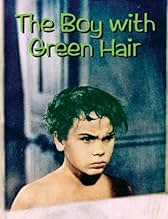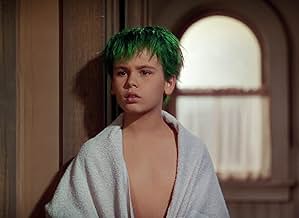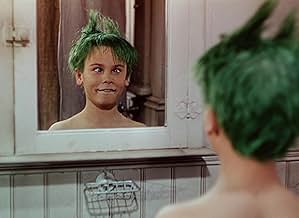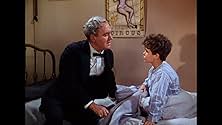IMDb RATING
6.7/10
3.4K
YOUR RATING
This parable looks at public reaction when the hair of an American war orphan mysteriously turns green.This parable looks at public reaction when the hair of an American war orphan mysteriously turns green.This parable looks at public reaction when the hair of an American war orphan mysteriously turns green.
- Director
- Writers
- Stars
- Awards
- 2 wins total
Johnny Calkins
- Danny
- (as John Calkins)
Curtis Loys Jackson Jr.
- Classmate
- (as Curtis Jackson)
Peter Brocco
- Bit Part
- (uncredited)
- Director
- Writers
- All cast & crew
- Production, box office & more at IMDbPro
Featured reviews
'The Boy with Green Hair (1948)' feels very much like a British film. I'm not quite sure why, but it's probably not because of Pat O'Brien's would-be Irish accent. The manner in which director Joseph Losey blends vivid working-class realism with elements of fantasy reminded me of Carol Reed's 'A Kid for Two Farthings (1955).' Both films feature a boy protagonist using fantasy to find solace amid the harsh realities of life – in Peter Fry's case, to come to terms with the death of both parents during the London Blitz. Young Dean Stockwell, who the previous year had played Nick Charles Jr. in 'Song of the Thin Man (1947),' gives a surprisingly mature and sensitive performance as the youth whose hair inexplicably turns green one morning. Displaying unique range for an actor of his age (and upstaging his adult co-stars), Stockwell oscillates between fresh-faced enthusiasm, timidity, resolution, and, in the film's framing sequences, a hardened resentment towards society.
Losey released his film in the relative calm between the end of World War Two and the slowly escalating Cold War, when the United States was still coming to terms with its losses. Far from simply being a fluffy, imaginative children's film, 'The Boy with Green Hair' has more ambitious aspirations, an anti-war film only years after Hollywood collectively urged audiences to stand up and fight. Given that the director was later blacklisted for alleged Communist affiliations, one finds it tempting to regard his film as political allegory of sorts. Stockwell's Peter Fry is an ordinary boy, liked and respected by his friends and acquaintances throughout town. Then he is physically branded with an arbitrary label, one that doesn't change the sort of person he was or is, but that is nevertheless viewed by society as unnatural and potentially dangerous. He is ostracised, harassed, and abandoned by his friends, ultimately forced to flee their persecution. Peter Fry was labeled with green hair; Losey, and hundreds like him, was labelled a Communist.
Every time I watch a film with Pat O'Brien he's forced to play it straight, so it was good to see him having some fun as Gramps, a faded Irish vaudeville performer who takes Stockwell's war orphan into his home and proudly adopts him as a grandson. Behind the hammy accent there's something distinctly wistful about O'Brien's performance, the ghost of a tired old man clinging to his long-gone youth, unable to properly nurture the next generation because he never grew up himself. Robert Ryan also appears as a child psychologist who interviews Peter, but he's not given anything much to do aside from listening to the boy's story, his characteristic intensity temporarily subdued. The film is shot in sumptuous Technicolor that almost looks too vibrant to be real, pushing the border between reality and imagination. Overall, 'The Boy with Green Hair' is both an intriguing children fantasy and a powerful anti-war fable, tinged with that childhood innocence that makes every ideal seem so attainable.
Losey released his film in the relative calm between the end of World War Two and the slowly escalating Cold War, when the United States was still coming to terms with its losses. Far from simply being a fluffy, imaginative children's film, 'The Boy with Green Hair' has more ambitious aspirations, an anti-war film only years after Hollywood collectively urged audiences to stand up and fight. Given that the director was later blacklisted for alleged Communist affiliations, one finds it tempting to regard his film as political allegory of sorts. Stockwell's Peter Fry is an ordinary boy, liked and respected by his friends and acquaintances throughout town. Then he is physically branded with an arbitrary label, one that doesn't change the sort of person he was or is, but that is nevertheless viewed by society as unnatural and potentially dangerous. He is ostracised, harassed, and abandoned by his friends, ultimately forced to flee their persecution. Peter Fry was labeled with green hair; Losey, and hundreds like him, was labelled a Communist.
Every time I watch a film with Pat O'Brien he's forced to play it straight, so it was good to see him having some fun as Gramps, a faded Irish vaudeville performer who takes Stockwell's war orphan into his home and proudly adopts him as a grandson. Behind the hammy accent there's something distinctly wistful about O'Brien's performance, the ghost of a tired old man clinging to his long-gone youth, unable to properly nurture the next generation because he never grew up himself. Robert Ryan also appears as a child psychologist who interviews Peter, but he's not given anything much to do aside from listening to the boy's story, his characteristic intensity temporarily subdued. The film is shot in sumptuous Technicolor that almost looks too vibrant to be real, pushing the border between reality and imagination. Overall, 'The Boy with Green Hair' is both an intriguing children fantasy and a powerful anti-war fable, tinged with that childhood innocence that makes every ideal seem so attainable.
I saw the Boy With Green Hair a long time ago and it stayed with me. It was hard to imagine all that fuss even back in the 1960'3 over one poor kid who's hair just happened to turn green. But, like others have mentioned consider the times and the era. World war Two had just ended and the Cold War had just begun. I can still remember people picking on"long hairs" in the early sixties because they let their hair grow a bit. This is a very memorable, stay with you classic about tolerance of different people, especially those with no choices in the matter. It is worth watching and renting and possibly buying. Too many movie critics on these pages and with older movies try to applies today norms and political correctness to decades old movies when the norm was different then. The movie is an excellently acted parable. I am surprised it hasn't been released on vhs or dvd or just plain shown more often on some of the cable movie channels. Unlike today, no kid back, especially a boy would have dyed their hair green. It may be a movie from a different era but the message is still the same regardless of the times. It may be dated a little, but it is still a classic.
This film really touched me as a child. Firstly, it was the only serious film about a kid, with a kid as the star, that I had ever seen. None of this Disney stuff. Though later came the '5,000 Fingers of Dr.T', another great film for youngsters. Secondly, it was about a child's pain and inner life. There are a few platitudes thrown around by the wooden adults but the film seems to aim at exposing this kind of no-communication. It just isolates and abandons a youngster when they most need a strong and comforting adult connection.
Every time I see this film again it is just as good as the first time. Another interesting aspect of this film's story is that although the boy has lost both of his parents during WWII, he has become stuck and needs to move on and incorporate this difficult time. And in doing so he becomes aware of the many WWII orphans everywhere and becomes able to identify himself with the many children who are in his own circumstances or worse. He doesn't feel so alone. He finds that he truly cares about the suffering of other orphans and wants to do something to alleviate this suffering.
There! And I didn't give away the 'green hair' thing. I have a collection of anti-war films- Glory-Three Kings-Courage Under Fire-Coming Home. I only need "The Best Years of our Lives' and the 'Boy with Green Hair' to make it complete.
Every time I see this film again it is just as good as the first time. Another interesting aspect of this film's story is that although the boy has lost both of his parents during WWII, he has become stuck and needs to move on and incorporate this difficult time. And in doing so he becomes aware of the many WWII orphans everywhere and becomes able to identify himself with the many children who are in his own circumstances or worse. He doesn't feel so alone. He finds that he truly cares about the suffering of other orphans and wants to do something to alleviate this suffering.
There! And I didn't give away the 'green hair' thing. I have a collection of anti-war films- Glory-Three Kings-Courage Under Fire-Coming Home. I only need "The Best Years of our Lives' and the 'Boy with Green Hair' to make it complete.
I, too, first saw this film a little while after it came out, when I was younger than the main character was supposed to be. It has stayed with me for the next half-century, and I considered myself very lucky to find a video in a sale bin about ten years ago.
Really, it foreshadowed the '60's - it is not only about the fact that being different should be OK, but more about the consequences of intolerance, about folks' reactions, their illogic, and where those reactions can take us. This is all done with a nice soupcon of fantasy to make the moral point easy to understand (subtlety isn't the film's strong point).
There's a story in the newspapers about a twelve-year-old boy in 6th grade who last week came to school with hair dyed green for St. Patrick's day, incidentally. Three guesses what happened to him....
See this movie.
Really, it foreshadowed the '60's - it is not only about the fact that being different should be OK, but more about the consequences of intolerance, about folks' reactions, their illogic, and where those reactions can take us. This is all done with a nice soupcon of fantasy to make the moral point easy to understand (subtlety isn't the film's strong point).
There's a story in the newspapers about a twelve-year-old boy in 6th grade who last week came to school with hair dyed green for St. Patrick's day, incidentally. Three guesses what happened to him....
See this movie.
It would be an obvious point to state that "The Boy with Green Hair" is one of the most touching fantasies ever put on film, for indeed it is that. But, over and above that, it's a movie which states that being different is all right. That and its pacifistic message made it a film very much ahead of its time and, thus, its reputation as a classic caught up with it over the years.
All of the performances are excellent. Dean Stockwell is probably best known to a later generation as the star of "Blue Velvet" and "Quantum Leap." But his best role came at the age of twelve with this film. In an understated yet powerful way, he's very believeable as the young war orphan, living with his grandfather, who is at first bewildered by his sudden change on hair color (Well, wouldn't YOU be?), but eventually comes to accept it and what it means, hoping his hair, which has been shaved off by superstitious townspeople, comes back green. Pat O'Brien, underplaying more than was usually his wont, gives a charming, yet insightful, performance as his kindly grandfather, a former vaudeville entertainer turned singing waiter. Robert Ryan, forsaking his usual villainous roles, is the child psychologist who helps Stockwell make sense of it all. And those who know Barbara hale primarily as either "Della Street" on the "Perry Mason" shows, the "Amana" lady, or William Katt's real-life mother, gives a brief but believable performance as Stockwell's sympathetic teacher.
Joseph Losey was the far-sighted director who brought all this to the screen. Unfortunately, the "dare to be different" and "give peace a chance" aspects of the story would work against him just a few years later, when he was blacklisted. All but unemployable in America, he continued his career in England, and the results, usually in collaboration with screenwriter Harold Pinter, were such critical, if not popular, successes, as "The Servant" and "The Go-Between."
In short, this an underseen film that deserves to be seen more often. These days it's frequently on AMC, so catch it.
All of the performances are excellent. Dean Stockwell is probably best known to a later generation as the star of "Blue Velvet" and "Quantum Leap." But his best role came at the age of twelve with this film. In an understated yet powerful way, he's very believeable as the young war orphan, living with his grandfather, who is at first bewildered by his sudden change on hair color (Well, wouldn't YOU be?), but eventually comes to accept it and what it means, hoping his hair, which has been shaved off by superstitious townspeople, comes back green. Pat O'Brien, underplaying more than was usually his wont, gives a charming, yet insightful, performance as his kindly grandfather, a former vaudeville entertainer turned singing waiter. Robert Ryan, forsaking his usual villainous roles, is the child psychologist who helps Stockwell make sense of it all. And those who know Barbara hale primarily as either "Della Street" on the "Perry Mason" shows, the "Amana" lady, or William Katt's real-life mother, gives a brief but believable performance as Stockwell's sympathetic teacher.
Joseph Losey was the far-sighted director who brought all this to the screen. Unfortunately, the "dare to be different" and "give peace a chance" aspects of the story would work against him just a few years later, when he was blacklisted. All but unemployable in America, he continued his career in England, and the results, usually in collaboration with screenwriter Harold Pinter, were such critical, if not popular, successes, as "The Servant" and "The Go-Between."
In short, this an underseen film that deserves to be seen more often. These days it's frequently on AMC, so catch it.
Did you know
- TriviaUnfortunately for the film's director, Joseph Losey, the eccentric, politically conservative Howard Hughes took over RKO while this film was being shot and, hating the film's pacifist message, did his best to sabotage it. Losey, however, managed to protect the integrity of his project. Screenwriter Ben Barzman, who was also later blacklisted along with Losey, would later recall that "Joe shot the picture in such a way that there wasn't much possibility for change. A few lines were stuck in here and there to soften the message, but that was about it." Barzman also remembered that 12-year-old Dean Stockwell was called into Hughes' office, and Hughes told him that when the other children spoke of the horror of war, he should say, "And that's why America has gotta have the biggest army, and the biggest navy, and the biggest air force in the world!" According to Barzman, little Stockwell was so in sympathy with the film's message that he dared to respond, "No, sir!" Even after Hughes started to scream at him, the boy held his ground and refused to do it. Dean Stockwell later played Howard Hughes in Tucker: L'homme et son rêve (1988).
- GoofsWhen the barber is preparing to cut his hair, a close-up shot shows a chunk of cut hair on his right side. Then when the barber begins cutting, it's not there. But re-appears for the next close-up of him crying.
- Crazy creditsDean Stockwell is credited simply as "The Boy" in the opening credits and as "Peter" in the end credits complete cast of characters.
- How long is The Boy with Green Hair?Powered by Alexa
Details
- Release date
- Country of origin
- Language
- Also known as
- El niño del cabello verde
- Filming locations
- Production company
- See more company credits at IMDbPro
- Runtime1 hour 22 minutes
- Aspect ratio
- 1.37 : 1
Contribute to this page
Suggest an edit or add missing content

Top Gap
By what name was Le garçon aux cheveux verts (1948) officially released in India in English?
Answer



































